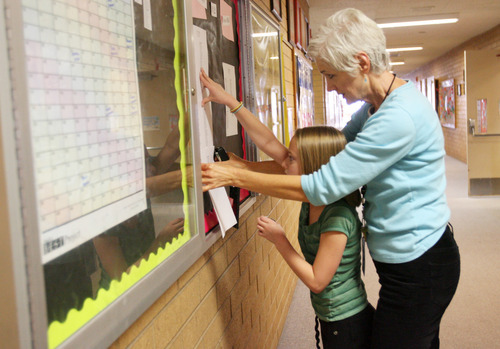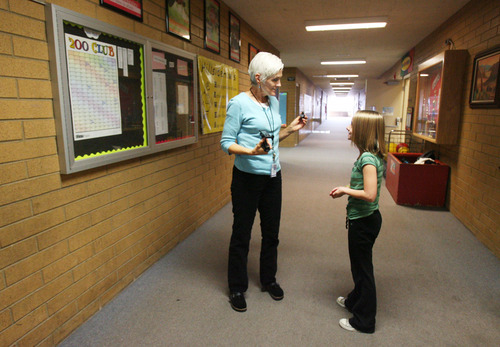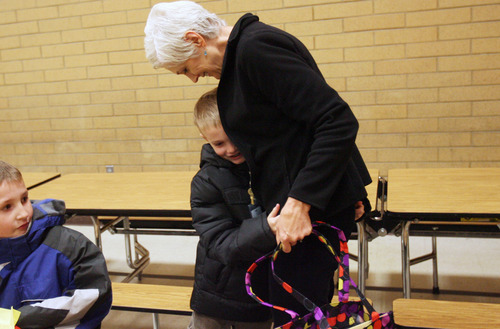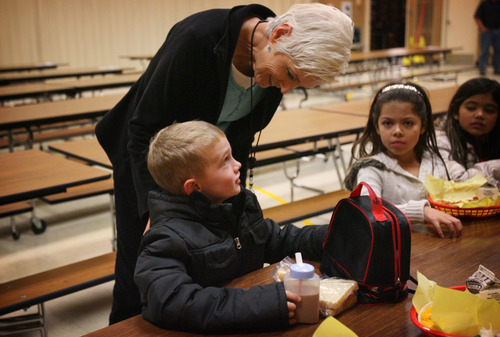This is an archived article that was published on sltrib.com in 2011, and information in the article may be outdated. It is provided only for personal research purposes and may not be reprinted.
Tiffani Leavitt watched her teenage daughter brush off a rude comment from a peer who had been bothering her at school. Under her breath, Sydni Leavitt whispered the mantra, "attitude, attitude, attitude."
Sydni was channeling a conversation she previously had with her grandfather about the problem. He gave her a poem, called "Attitude," and told her that while she couldn't control the things other people say, she could control the way she reacts.
"My dad is really good at talking to my kids if they're struggling with any aspect of their lives," said Tiffani Leavitt, who lives a half-mile from her parents in West Valley City. "You hear people say, 'It takes a village to raise a child.' [My parents] certainly have made my job as a parent easier."
Kids who have close relationships with grandparents are more likely to engage in positive social behaviors, according to a new study by researchers at Brigham Young University's School of Family Life.
"Perhaps grandchildren are repeating behaviors that they see in their grandparents, or maybe their grandparents are teaching some social skills that are unique," said Jeremy Yorgason, lead author of the report published recently in the Journal of Research on Adolescence.
An emotional tie to a grandparent also was associated with higher school engagement in the short term. The study surveyed 408 children between the ages of 10 and 14 twice in a two-year period, asking children to rate their relationships with grandparents and the frequency with which they engage in such behaviors as cheering up someone who is sad or helping people who are not friends or family members. The study found grandparents have an effect regardless of whether kids have positive relationships with their parents.
"The take-home message is that when grandparents are involved, there's a benefit to the grandchildren," said Yorgason, a family life professor at BYU.
How to build a bond varies in every family, Yorgason noted, but it can be as simple as taking grandkids to do fun activities or expressing an interest in their lives. Children in the study who were considered to have strong ties with grandparents were those who not only "like" their grandparents, but who also talk to their grandparents about problems and important decisions.
Tiffani Leavitt said her parents, Gloria and Terry Kidd, spend time with her five children in a variety of ways, including regular Sunday dinners and holidays. Terry Kidd is the go-to guy for advice, and Gloria Kidd sometimes picks up the youngest, 4-year-old Britton, to be her buddy as she runs errands. As a secretary at Hillside Elementary, Kidd has watched Leavitt's children and those of a son progress through elementary school on a daily basis.
"The best part is when I'm walking down the hall and I hear, 'Grandma,' and two arms wrap around my leg," Kidd said. "I'm there if they get hurt or sick. I can take care of them. If they get an award, I can slip into the assembly and watch."
The grandparent study also found that, in single-parent households, regular financial contributions from grandparents boosted the degree to which children are engaged at school. (Mothers were surveyed and asked how often a child's grandparent gives financial help.) The money may enhance academic resources or help create an expectation in the home of academic achievement, the study noted.
Many grandparents, of course, would say they benefit, in turn, from time spent with grandchildren.
Mary Hill, a Salt Lake City grandmother, watches two of her grandkids, ages 10 and 13, before and after school while her son, a single dad, is at work. She feeds them breakfast and dinner and helps them with homework. Friday night is movie night and the whole family, including her son, goes to see a new flick.
"It's just a joy to have them around," she said. "It's almost like it's not whole unless they're with us."
Read the report
Read the study on grandparents' impact on kids • bit.ly/t10Kqd









